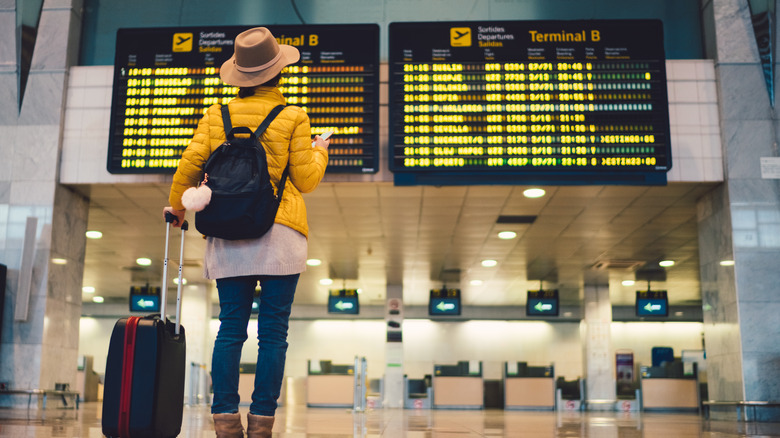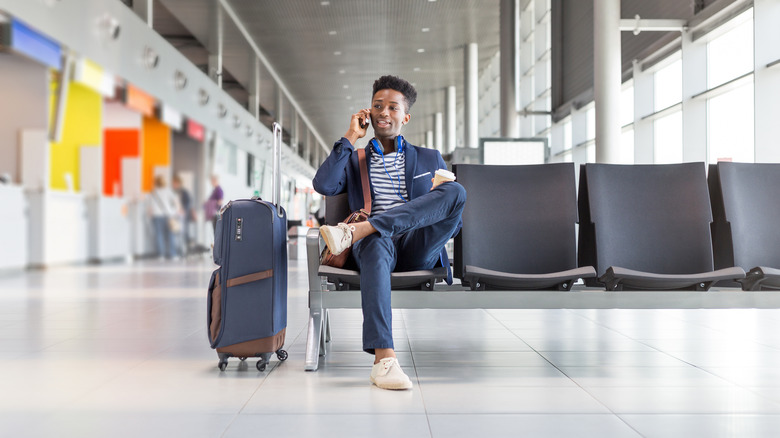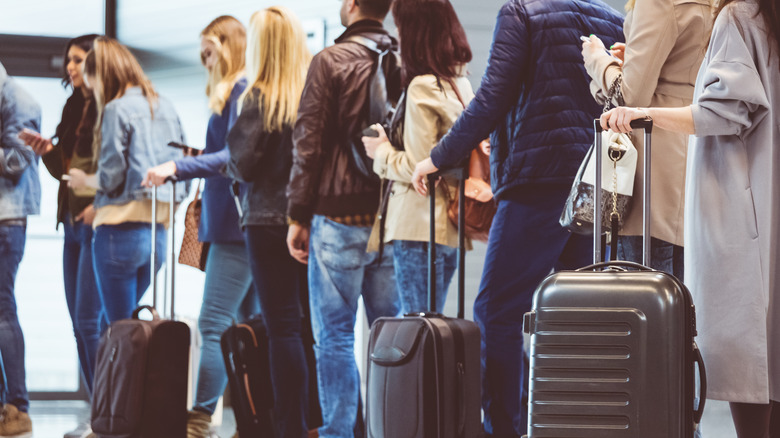What Happens If Your Flight Gets Canceled Due To An Incoming Hurricane
Traveling to the tropics during hurricane season can be tricky business. While severe weather events usually peak between August and October, technically hurricane season starts in June and lasts all the way through the end of November. It's easy to forget that Mother Nature can foil your travel plans when you're dreaming of sun-kissed resorts and white sandy beaches.
As advanced as weather forecasting technology can be, it's still difficult to predict the exact path a hurricane is going to take. Modern aircrafts are built to withstand hurricane-force winds, but most pilots won't chance it. Should something go wrong on board, like a medical emergency or technical glitch, it would be downright impossible to find a safe place to land. Not only is this dangerous for the cabin and crew on the plane, but it would be a PR disaster on the ground. It's simply not worth the risk. Instead, airlines build cancellation policies into their framework.
You may not know if your flight is going to get canceled until a couple of days beforehand, but at least there's a silver lining: you'll have flexible cancellation and rebooking options if there are flight changes due to an incoming storm. Every airline is different, but most offer goodwill fee waivers or a weather waiver. In the past, American, Frontier, and JetBlue airlines have even offered passengers complete refunds for major storms, reports The New York Times.
How to approach customer service
As soon as you realize the storm is bearing down on your path, review your airline's cancellation policy. Many airlines have a dedicated webpage for travel advisories and rebooking options. The airline may waive your change fees or offer credit to rebook within a specific window of time, like one year from the original purchase date. Now would be a good time to look up alternate routes and destinations away from the hurricane zone. You may be able to get a deal on them.
Before you hop on the phone with customer service, keep in mind that a crowd of disappointed customers are calling at the same time. A natural disaster can ground 1,000 to 5,000 flights, creating delays, reroutes, and missed connections at the main airport and elsewhere. As a result, tens of thousands of passengers will need customer service. For the best resolution, remain calm and give your rep a little grace. You'll also need to cancel other reservations, like hotels, rental cars, and excursions. If you're flying to another destination or connecting airport, make arrangements there as well.
If you haven't received a refund or rebooking deal in a reasonable amount of time — say, 30 days — reach out to the airline on social media. They have a dedicated PR team handling inquiries to prevent public fallout. If that goes nowhere, file a complaint with the Department of Transportation (DOT), who has 30 days to review your complaint and 60 days to resolve it.
How credit cards and travel insurance can help
Rock bottom fares and last-minute deals to hurricane-prone areas like Florida and the Caribbean may seem like a steal, but they don't offer any kind of refund or flexible rebooking policy. In the event of cancellation, that's money down the drain. But if you're seated in the main cabin and above, there should be some kind of travel protection built into the ticket price. An airline's elite members, frequent fliers, or credit card holders are most likely to get their change fees waived.
If you purchased your ticket using a major credit card outside of the airline, like Chase Sapphire Rewards or the Platinum Card from American Express, some travel protection is built right in. Travel insurance can also be helpful, so long as you have "cancel for any reason" coverage, which is usually a higher premium. You may have to eat some of the cost of your travel interruptions up front, but your insurance company will eventually reimburse you. Be sure to keep receipts of everything, from change fees to unforeseen costs wherever you're staying put.


